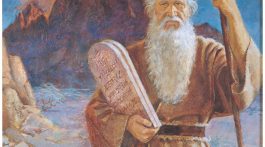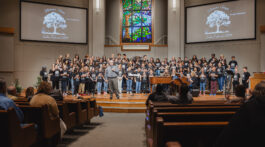Sabbath School Lesson for April 20-26, 2024
Overview of Lesson 4
Memory Text: ” ‘And as Moses lifted up the serpent in the wilderness, even so must the Son of Man be lifted up, that whoever believes in Him should not perish but have eternal life.’ “ John 3:14, 15 NKJV
Continuing the story of the great controversy, we are drawn once again to the persecution of God’s followers, which indicates the deadly lengths Satan will use to drown out God and His word.
Smyrna, one of the seven prophetic churches mentioned in chapters 2 and 3 of Revelation, was an ancient city (now the Turkish seacoast city of Izmir) that had a thriving Christian population. It was in the town square of Smyrna that an early church leader in the second century, Polycarp, lost his life when he refused to burn incense to the Roman gods.
But, the persecution only worsened, as each century brought more apostacy and alienation from God’s word. It was under the auspices of papal Rome that these tragedies occurred and lasted for 1,260 years (from 538-1798 A.D.). Looking at the sacrifices of faithful martyrs, such as the Waldenses, Wycliffe, and Huss, we are inspired by their unflinching loyalty to God and the Scriptures.
Read chapters 4-6 of The Great Controversy for the historical background of our lesson this week. It will cover these topics:
- Sunday: Persecuted Yet Triumphant–understanding the prophetic time period of 1,260 days
- Monday: Light Vanquishes the Darkness–learning the origin of the Waldenses and how they differed from the Franciscans
- Tuesday: Courage to Stand–valuing the work and sacrifices of the Waldensian Christians
- Wednesday: The Morning Star of the Reformation–finding out why John Wycliffe is called the Morning Star of the Reformation
- Thursday: Cheered by Hope–being sustained by the same hope of martyrs such as Huss, Jerome, Tyndale, and Latimer
Sunday: Persecuted Yet Triumphant
Intense persecution lasting 1,260 days or years is found in Daniel 7:25 and Revelation 12:6. Many think this time period represents the medieval years of 538-1798 A.D. when the papacy held supreme power over much of the Western world. 538 has been chosen because that was the year that the last barbarian tribe of Ostrogoths was driven out of Rome, and 1798 was the year that the pope was kidnapped and taken out of Rome by one of Napoleon’s generals.
Although many faithful Christian believers were tortured and even lost their lives during those difficult years, we are encouraged that their sacrifices were not in vain. God’s cause prevailed, and they, like the persecuted church in Smyrna, would be rewarded by receiving a crown of life (Revelation 2:10).
We, also, are uplifted when we realize that times of persecution are limited, as this one was, and God is ultimately in control of events. This would, thankfully, include the final, fierce persecution we know is to occur just before Christ’s promised return to earth to take us home with Him (Matthew 24:21, 22).
Bible Verses:
- Numbers 14:34 and Ezekiel 4:6
Why do you think it’s reasonable to use the day/year principle in these verses (and others) about the 1,260 days prophecy?
- Daniel 8:23-25 and Revelation 12:6, 14
Why do you think we are given such a definitive timeframe of persecution, as seen in these 1,260 days, or prophetic years?
- Matthew 24:21, 22
How do these verses calm our fears about that final persecution in the last days?
Monday: Light Vanquishes the Darkness
At the beginning of the thirteenth century, two priests, both from wealthy backgrounds, decided to take vows of poverty and established orders in the Roman church. One was Francis of Assisi (1181-1226) and the other, a few decades earlier, was Peter Waldo (d. 1205).
The monastic order of Franciscans was recognized by the pope, and still exists today (the present Pope Francis even honoring him by adopting his name). The difference in these two movements was the acceptance of the pope as their spiritual authority on earth by the Franciscans. The Waldenses, however, refused to give such allegiance, maintaining that their authority came from God’s holy Scriptures. The pope, therefore, declared that the Waldenses were heretics and sought to eliminate their influence by torture and death.
But the courage of these brave martyrs inspired early Reformers to stand for Bible truths, as they were revealed to them. Many of them also lost their lives for their beliefs.
Bible Verses:
- Jude 3, 4
Why do you think these two verses were so meaningful to the Waldensian believers in the Middle Ages?
- Revelation 2:10
What does it mean for the persecuted church members of Smyrna to have a crown of life?
How does this verse encourage anyone who is persecuted for his faith?
Tuesday: Courage to Stand
Waldensian believers, forced to flee to the mountains of northern Italy and southern France, found ways to share their faith, despite the harsh living conditions in such mountainous terrain. They were one of the first groups to have the Bible in their own language. They lived before the invention of the printing press, so with great effort, they copied the Scriptures by hand.
Not content to have God’s word just for themselves, they found ways to share it with those outside their own communities. Young people, who had been encouraged to memorize large passages of Scripture, traveled outside their mountain homes with portions of the handprinted word hidden in their clothing to share with those who were hungering to know God better. They went about as merchants and some enrolled in universities--finding ways to share their faith, despite the danger of being exposed as a Waldensian heretic and imprisoned or even tortured and killed.
We are grateful for the vital role those courageous Waldenses played in preserving Bible truths for generations to come.
Bible Verses:
- Acts 5:28-32, Ephesians 6:10-13, and Revelation 3:11
How would these messages have instructed and encouraged the Waldensians, and why should we also use God’s word for guidance and comfort today?
Wednesday: The Morning Star of the Reformation
Many people view Bible study as a boring duty that is unpleasant most of the time. But the early Reformers of God’s church had a different feeling about it. They relished their time spent in God’s word. To them, it was a treasured time that they valued above all else. The Bible was their source of hope and power to withstand the attacks of Satan.
John Wycliffe, a fourteenth-century English scholar from Oxford, was one of the first to question the pope and some of the beliefs and practices of the medieval church. His translation of the Bible into the common language of the people was a tremendous service that contributed immensely to efforts to reform the church. Therefore, he is known today as the Morning Star of the Reformation.
We can see how Wycliffe’s work led to the principle of sola scriptura, which maintained that the Scriptures alone were enough to communicate God’s will to individual believers.
Bible Verses:
- Psalm 19:7-11, 119:140, 162, and Jeremiah 15:6
How and why should the Bible bring us such joy?
- 2 Timothy 2:1-3
Why is it important to share God’s word and not just study it?
Thursday: Cheered by Hope
Many of the early Reformers gave their lives for Christ and for the truths they were shown, one at a time, in the Bible. Huss, Jerome, Tyndale, and Latimer, to name a few. Looking beyond what they were suffering to the hope they had in the promise of eternal life made it possible for them to endure their horrific trials of imprisonment and deprivation.
The strength of God was sufficient to sustain them through it all. And we can find the same strength when we place our lives in the hands of our loving, omniscient Savior. With unwavering faith and hope, they were an example for us to bear our trials with patient endurance.
Reading the stories of the lives of these Reformers in books like The Great Controversy gives us renewed faith to push back our own spiritual darkness and see the light of God’s glory shining through. God always finds a way, where we see no way out.
Bible Verses:
- Hebrews 2:14, 15
How did Jesus’ death destroy the devil?
- John 5:24, 11:25, 26, 14:19, and 1 John 5:11-13
Why is it important to know that we are guaranteed eternal life and that He will continue to forgive us when we believe on Him and repent of our sins?
Friday: Final Thoughts
The Roman Catholic Church, by the second millennium after Christ, had become a fearsome, commanding giant with a corrupt, hierarchal authority that ruled most of Europe. Kings, queens, and all those who governed, were forced to pay allegiance to the pope’s demands.
Satan. through the papacy, was determined to make himself the king of kings, and lord of lords, instead of Christ–the only one worthy of that holy title (Revelation 17:14). The devil’s deceptions worked so well back then, that God has predicted that he will use that same tactic in the last days, when persecution is said to once again raise its ugly head (Revelation 13:11, 12).
By God’s grace, however, there were some believers in the second millennium who were beginning to see the disgraceful compromises with God’s word that had slowly become embedded in doctrines of the medieval church. The conduct of the priests themselves was seen as totally opposite of Christ’s humble character and loving ministry.
One by one, Reformers rallied against the papacy’s ironclad rule. The light of God was shone on how the faithful few should proceed with their individual complaints. To each of the Reformers was given some truth from God’s word to magnify and turn the church around.
Next week, chapters 7-11 of “The Great Controversy” will show us about the work of Martin Luther and Zwingli, who played major parts in the Protestant Reformation.
“The Great Controversy” in today’s English, called “Love Under Fire”, is available online at https://media2.egwwritings.org/pdf/en_LF.pdf
Next Week: Faith Against All Odds
To read the Sabbath School Lesson Quarterly and see more resources for its study, go to










